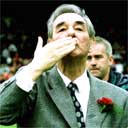Brian Clough, one of the game's greatest ever managers and characters, died today at the age of 69.
The former Nottingham Forest and Derby manager, who had had a long battle with alcoholism, died at Derby City Hospital after suffering from stomach cancer. He had had a liver transplant last year because of a cancerous growth in the organ.
Ol' Big 'Ead will be remembered for his staggering achievements in taking two small provincial clubs from the depths of the second division to the league championship.
After a fine career as a predatory striker, in which he scored 251 goals in 274 matches for Middlesbrough and Sunderland and won two England caps, Clough took up the managerial reins at Hartlepool in 1965.
Two years later he was appointed boss at Derby County, and he soon let his players know it. Asked how he dealt with a player who disagreed with his tactics, Clough said: "We talk about it for 20 minutes and then we decide I was right."
Here was a true character, the likes of which we may never see again. He had minimal resources in terms of playing staff, but his sheer personality was enough to convert those at his disposal into world-beaters.
Promotion was followed by a phenomenal triumph in taking little Derby to the championship and the European Cup semi-finals. Brief spells at Brighton and Leeds United - just 44 days at Elland Road - were less successful, but they brought him to Nottingham Forest, where he was to become an all-time legend.
Within three years of his appointment, Clough had led Forest to the league championship; a season later, in 1979, his team were champions of Europe after Trevor Francis's header secured victory against Malmo.
His success lay in his ability to transform players such as Tony Woodcock and Martin O'Neill into household names by instilling his passion and know-how into them. He kept his messages to his players simple, and in their simplicity they found their effectiveness. "If God had wanted us to play football in the clouds, he'd have put grass up there," Clough famously said, demanding a passing game.
He was also forthright enough to let his players know who was in charge in no uncertain terms. "The ugliest player I ever signed was Kenny Burns," Clough said about his talented new purchase, who he thought was getting too big for his boots.
Such charisma maintained his position at the City Ground for 18 years. The fearful respect he instilled in all he met - footballers, fans or journalists - is well documented, and summed up perfectly by the episode in which he decked midfield aggressor Roy Keane. "I only ever hit Roy the once," he explained. "He got up so I couldn't have hit him very hard."
His rule over the City Ground extended to the stands. When fans overstepped the mark, they, too, felt the brunt of the boss. Following a convincing League Cup victory over QPR in 1989, Forest supporters invaded the pitch, much to the chagrin of Clough. He stormed out and his fists were far more potent than nearby police officers in quickly removing the trespassers.
At Forest, Clough won the European Cup a second time - in 1980, thanks to a John Robertson winner against Hamburg - the European Super Cup and three League Cups.
The only honour missing was the FA Cup. The closest he came was in 1991 when his team reached the final. Clough dispensed with the traditional jacket-and-tie dresswear managers normally adopt, emerging with his lucky green jumper. With Paul Gascoigne injured and Forest one-up thanks to a thunderbolt from Stuart Pearce, that elusive medal was surely Clough's. But an equaliser from Paul Stewart and an own goal from Des Walker put an end to his hopes.
Two years later, Clough's reign finished in sad circumstances. His team was a fragile version of the all-conquering squad a decade before, and despite Clough's genius off the pitch, and his son Nigel's on it, Forest were relegated when they were beaten at home by Sheffield United.
The biggest regret in his career, though, was that he was never offered the England job. Clough would have been perfect for such a role but his unique methods of extracting the best from his men were too revolutionary for the conservative suits at the FA.
It was more a loss for England than for Clough. Today, however, everyone is feeling the gaping hole he leaves behind.
